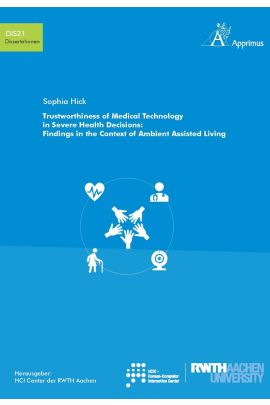The societal effects of the aging society are one of the biggest challenges in the Western world. Growing old is often accompanied by multi- and co-morbidities, such as hypertension, diabetes, or arthritis, but also age-related problems, such as loss of muscle mass, walking instabilities, and more. As a consequence, the need for care and dependency on other people increases. In conjunction with the ongoing demographic change of population and medical needs related to older age, there is an increasing shortage of healthcare workers which is estimated to worsen in the next years. In order to combat these issues, technological advances, e.g., in the context of video-based ambient assisted living (vAAL), offer solutions that alleviate some of the tasks otherwise carried out by caregivers. However, the implementation in home and care facilities has failed up until now. Potential users of these technologies, e.g., people of advanced age, people with chronic illnesses and/or disabilities, but also professional and informal caregivers have to be incorporated into the design stages of vAAL system. What they think and feel about these approaches is an important factor in building long-lasting results for the challenges we face. Trust is an imperative variable than spans from the patient-physicians relationships to the evaluation of AAL systems. Specifically in the medical context, it is present in every-day interactions and is constantly strengthened or weakened. The transfer of interpersonal trust to that of trust in technology is imperative to gather a holistic picture of how evaluations in these systems by prospective users come together. Only when considered together in the broader context of health and disease management, implementation of these systems is realistic. In addition, situational variables as well as the consideration of health-related predictors are crucial for the understanding of trust in these systems. In a multi-method empirical approach, the work of this thesis has outlined predictors of trust, situational aspects, and identified patterns of decision making with respect to trusting vAAL system. Communication strategies and recommendations for the design of vAAL systems as well as the healthcare system are derived. The implications should be considered both in practice and future research to truly implement an inter-disciplinary approach to solving the grand societal issues of healthcare and the promising role of assistive technology in it.
| Autor | Hick, Sophia |
|---|---|
| Gewicht | 0.216 kg |
| Erscheinungsdatum | 07.01.2025 |
Eigene Bewertung schreiben
Human Computer Interaction Center (HCIC)
Trustworthiness of Medical Technology in Severe Health Decisions: Findings in the Context of Ambient Assisted Living
ISBN: 978-3-98555-249-8
Lieferzeit: 2-3 Tage
54,00 €
inkl. 7% MwSt.
Kurzbeschreibung
The effects of the aging society are putting an increasing strain on the healthcare system. Assistive technologies offer solutions that alleviate some of the tasks otherwise performed by caregivers. However, the implementation has failed so far. Perceptions of trust by potential users are crucial in the implementation of these systems. In a multi-method empirical approach, this thesis has investigated trust perceptions with respect to these systems and recommendations are derived.
Auf Lager

